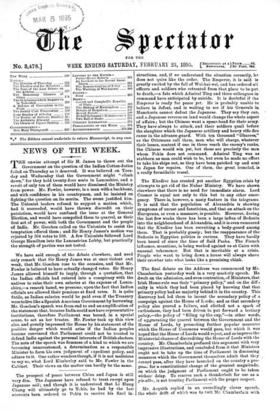We have said enough of the debate elsewhere, and need
only remark that Sir Henry James was at once violent and weak, that Mr. Goschen rose to the occasion, and that Mr. Fowler is believed to have actually changed votes. Sir Henry James allowed himself to imply, through a quotation, that the Indian officials had entered into a conspiracy with the natives to raise their own salaries at the expense of Lanca- shire,—a remark based, we presume, upon the fact that Indian officials are allowed their pensions at fixed rates. It is quite futile, as Indian salaries would be paid even if the Treasury were to live like a Spanish American Government by borrowing. Mr. Goschen's speech was from end to end an amplification of the statement that, because India could nob have representative institutions, therefore Parliament was bound, in a special sense, to act as her trustee. Mr. Fowler took up this view also, and greatly impressed the House by his statement of the positive danger which would arise if the Indian peoples became convinced that Parliament could not be trusted to defend India against the personal interests of British electors. The note of the speech was firmness of a kind to which we are becoming unaccustomed, a determination as a responsible Minister to form his own judgment of expedient policy, and adhere to it. One rather wonders though, if it is not malicious to say so, what Lord Kimberley said to Mr. Fowler in the Cabinet. Their views on the matter can hardly be the same.


































